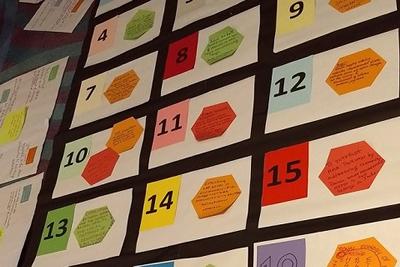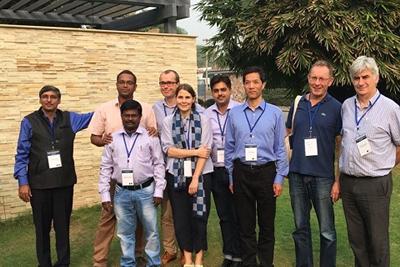NAMRIP part of successful team at the Indo-UK Sandpit in New Delhi

NAMRIP member, Dr Xunli Zhang, was one of 20 UK academics selected to attend a residential interactive workshop, from 6-10 November, where he became part of one of the teams with a project chosen to go forward to the full proposal stage.
The ESRC UK-India Antimicrobial Resistance Sandpit Event, which was held in New Delhi, was designed to lead to the formulation of collaborative research projects to address the issue of antimicrobial resistance (AMR) in humans, animals and the environment in India. The sandpit first facilitated the formation of teams. The teams then worked on developing outline proposals to be, if chosen, subsequently developed into full proposals. Successful proposals developed through the sandpit will be jointly funded by the UK Research Councils and Department of Biotechnology (DBT), Government of India.
On the UK side, this initiative will be funded by the Newton Fund. The Newton Fund, known as the Newton-Bhabha Fund in India, builds research and innovation partnerships with 18 partner countries to support their economic development and social welfare, and to develop their research and innovation capacity for long-term sustainable growth.
There were representatives at the sandpit from microbiology, medicine, chemistry, engineering, agriculture, fisheries, environmental sciences, bioinformatics, design/art, economics, and social sciences. On the final day, the outline proposals were ranked and shortlisted. Then nine were selected and those teams presented their proposals to the meeting.
One of the successful shortlisted projects was devised by the team which Dr Zhang was part of. The team includes 6 UK PIs from 6 different disciplines; and 7 Indian partners. Their 3-year project: ‘User Driven Diagnostics Solutions in a One Health Approach to Tackle AMR’, requested £2.29M FEC (RCUK will fund 100% FEC). The estimated share for the University of Southampton is £350K. The project is possibly the only technology-focused one among the nine projects that were shortlisted. The team will now formulate a full proposal for submission in January.

Proposal summary:
We address the lack of appropriate affordable diagnostics in use in India to tackle AMR in a One Health perspective. We believe that a major reason for this lack is a mismatch between user needs and diagnostic test development aims, alongside a lack of suitable technologic solutions. Our objectives are to engage in the community with users in human healthcare, veterinary and environmental settings to map existing practise and gather user needs to generate target product profiles and user personas. We will use the user input to select existing diagnostics and develop novel tests in a usable format plus performance and prototype services. This programme will deliver evidenced user needs as well as performance trialled test prototypes to tackle AMR. This cross-council funding activity has a clear requirement for a multidisciplinary approach, which needs to cover not only science, engineering and medicine, but also social sciences, which have a vital part to play.
Some of the team members are shown in the photograph:-
Back row l-r: Naresh Kumar (ICAR-NDRI. Karnal), Ravikrishnan Elangovan (Indian Institute of Technology, Delhi), Till Bachmann (University of Edinburgh), Amitabha Bhattacharjee (Assam University)
Front row l-r: G. K. Sivaraman (ICAR- Central Institute of Fisheries Technology), Alison Prendiville (London College of Communication - University of The Arts London), Xunli Zhang (University of Southampton), Dominic Moran (University of Edinburgh), Stephen Rimmer (University of Bradford)